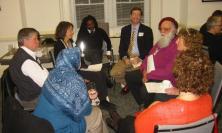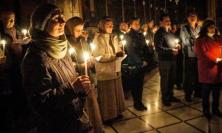As the season of Lent begins, Michael Barnes SJ compares Christian and Muslim approaches to fasting, prayer and almsgiving, and considers what the two traditions might have to learn from each other.
At this moment of the Church’s year, as Christians gather to receive the ashes and begin the long period of Lent, my thoughts always turn to Muslim friends and to various conversations which I have enjoyed on the subject of fasting.
‘How much do Christians fast?’ is a question they always ask. I suspect they already know the answer. Not a lot when compared with the daily fast that Muslims keep so strictly during the month of Ramadan. I used to feel faintly embarrassed about my pathetic little efforts on Ash Wednesday and Good Friday. More recently I have learned to avoid naïve comparisons. Dialogue is ill-served by exercises in religious one-upmanship. When a more settled and personal friendship has been established it is possible to prise behind the clichés. What do we expect fasting – and prayer and almsgiving and all the other Lenten practices of faith – to do for us? What part do they play in the living out of those ancient patterns of holiness which are inscribed in our sacred texts and traditions? And what can Muslims and Christians learn from each other?
There are, of course, many similarities between Christianity and Islam in terms of actual religious practice. Each of the ‘five pillars of Islam’ - shahada, the statement of belief, salat, prayer, zakat, almsgiving, sawm, fasting, and hajj, pilgrimage – has its parallel and a similar purpose in Christianity. Prayer in both traditions is an act of remembrance and praise, putting God first and returning all God’s favours to their ultimate source. Fasting is intended to promote a proper sense of priorities and develop self-discipline. Almsgiving redresses the balance in God’s creation and reminds people of the needs of the poor. Even statements of belief and pilgrimages, for all that they differ in many particulars, have certain fundamental points in common. In both Islam and Christianity religious life begins with the initiation of a public commitment which then takes the form of a sometimes arduous journey. In both that journey is punctuated by moments of withdrawal for prayer, for acts of self-discipline, and not least for remembering that God expects a faith which does justice.
Once we probe a little deeper, subtle and sometimes more obvious distinctions make themselves felt. Prayer in Islam conjures up images of serried ranks of worshippers all bowing in the direction of Mecca. This, however, is no act of mindless regimentation. For the Muslim prayer is a public exercise which brings the entire umma, the community of faith, into a very physical submission to God. In conversation with Muslims I have noted a certain sense of what Catholics would call the ‘communion of saints’. Prayer, even when practised alone, is never a solitary effort. Muslims experience a solidarity in faith, not just with their fellow-believers but with the spiritual universe of protectors and prophets. Muslims pray with the body, standing, bowing and prostrating. God is the centre of prayer but the act of turning the head to each side establishes bonds with one’s companions and acknowledges the support of guardian angels.
Fasting is not an occasional act but a regular ritual. The breaking of the fast, at dusk on each day of Ramadan, is another very public ritual which brings the community together. Prayers are said, a single date is eaten and a sip of water drunk, a welcome respite after hours of restraint. Then food and drink are dispensed to all present. As with the rhythm of the prayer, fasting is a public not a private matter - and so is the thanksgiving celebration which marks the end of each day. People act together, rising at the same time, observing prayer times and keeping the fast, then together offering all back to God as the night closes in.
Almsgiving, formalised as a sort of tithe or wealth tax, is a further dimension of public commitment – this time to the less fortunate members of the community. But the motivation is rooted less in ‘charity’, a free giving away of an over-abundance, than in a recognition that all assets are held as a trust from God. In the Qur’an it is said that ‘They will question you concerning what they should bestow voluntarily. Say: “whatever good thing you bestow is for parents and kinsmen, orphans, the needy and strangers and whatever good you do God has knowledge of it’ (2.211). Like everything else in Islam, almsgiving has a primarily theological purpose. However much it may sound like legal prescription, it is the motivation – to align one’s every act and desire with the will of Allah – which counts.
The last time I attended the breaking of the fast, we were told that prayer and self-denial and almsgiving had one purpose only – to increase taqwa or ‘God-consciousness’. This lovely word has connotations of being known to God, becoming deeply anchored in God’s love. The fasting month of Ramadan builds up a communal solidarity which witnesses to the unity of God. At its best Islam is a tradition which celebrates the God of creation, God as the first and last enlivening force which holds the whole of that creation in being and invites human beings to participate in and be responsible for the fruits of God’s generous love.
I find much to admire here. But I am also acutely conscious that the gospel reading for Ash Wednesday has Jesus preaching the Sermon on the Mount. ‘When you give alms, do not blow a trumpet before you, as the hypocrites do in the synagogues and in the streets to win the praise of others…. When you pray, do not be like the hypocrites, who love to stand and pray in the synagogues and on street corners so that others may see them. …. When you fast, do not look gloomy like the hypocrites. They neglect their appearance, so that they may appear to others to be fasting.’ Rather, almsgiving, prayer and fasting are to take place away from the public gaze - ‘and your Father who sees what is hidden will repay you.’ (Matt 6:1-7)
I have yet to meet a Muslim who blows a trumpet or anoints his face to make it look miserable. On the contrary, the humility exhibited in the manner of praying is quite palpable. But Jesus’s words do put the two traditions into sharp relief. What is very public in Islam is very private and personal in Christianity. That may say something about the inner dynamics of the two faiths.
It is, of course, always possible that ritual can become ritualism – a reliance on form for its own sake. But clearly Jesus is not criticising public religion as such. It is, rather, the pride of ‘the hypocrites’, their concern to have their virtue advertised in the public sphere, which excites his ire. To that extent his words are addressed to each one of us, whenever we make a show of ‘my’ prayer and ‘my’ good works. The Muslim would agree. Just as the Christian puts his faith in the Father who ‘sees what is hidden’, so the Muslim is guided by the conviction that, as the Qur’an puts it, ‘whatever you give, God knows of it’ (3.86). For both traditions human beings receive from God an extraordinary dignity which makes them capable of responding to God. This dignity we may, of course, abuse. But in so far as it is treated as pure gift, the transforming power of God, it remains eternally creative.
Where do the traditions differ? What holds Judaism, Christianity and Islam together is the priority ascribed to the Word of God which is spoken in the world. Jews, Christians and Muslims fast and pray and give alms out of obedience to God’s command. But that Word is received in different ways; or, to put it another way, it is communicated in different ways and therefore evokes different human responses. Strictly speaking for Muslims God reveals his will; for Christians, of course, God reveals himself. In Christianity the Word is not ‘enbooked’, as in Islam, but made flesh. The particular form which obedience to the Word takes – what it implies in human terms – gives our respective faiths a particular flavour.
The first word of the Qur’an is ‘recite’. Muslims gather to praise God in what are, for them, the very words of God revealed through the prophet Muhammad. The practices of the ‘five pillars’ are all rooted in that one all-encompassing command. To recite what are God’s words, as the prophet himself obediently repeated God’s command, is not just to speak but to do, to be faithful to God’s Word in all aspects of one’s life.
For Christians, of course, there are many imperatives. The Gospel is full of them, from the ‘repent and believe’ of Jesus’s first preaching of the Kingdom to the ‘do this in memory of me’ spoken over bread and wine at the Last Supper. There is the invitation to the tax-collector to ‘follow me’, the command to the fishermen to ‘put out into the deep’, the intriguing counter to the question of John’s disciples, ‘come and see’. Why so many? Perhaps because we human persons in all our pride and perverseness require a good deal of probing and cajoling if the Word of God is to make a home in our hearts.
That is what makes Christian prayer and pilgrimage - the ‘framing activities’ of the Christian version of the ‘five pillars’ - more personal. The metaphor of the journey brings together the many different dimensions of the human relationship with God. We begin with the well-meaning assent to ‘repent and believe’ and end with the desolation of ‘sit here while I pray’. From the sober self-confidence of Ash Wednesday to the poignancy of Holy Week, there is an intrinsic stillness, even a loneliness,about Lent. Discipleship can be a painful business, not because of any asceticism we may practise, but because the very unpredictability of the journey may make us feel uncomfortable. Repentance is risky; it calls for difficult choices to be made.
What makes it all possible, however, is not the grim determination to succeed but another imperative, the words which follow the Gospel reading for Ash Wednesday. ‘Pray like this.’ Jesus’s own prayer, his relationship with the one he calls Father, is the heart of all Christian living, the life-line of Lent. To pray in these words is not a preparation for the way; it is, more exactly, prayer on the way – a prayer in company with the one who is himself the Way.
Lent is like Ramadan in the sense that the community of faith is formed by several weeks of prayer, fasting and almsgiving. But Ramadan is essentially a daily round, a ritual which marks time and measures the rhythms of life. At the end of each day the process is repeated, until the entire spiritual and physical universe is gathered around a single point of time and creation is restored to a new harmony. The map of time which Christians seek to draw is more complex. Lent intensifies the relationship which the command to follow opens up. Indeed it is itself a pilgrimage in which through personal companionship with Jesus we are drawn more deeply into the intimacy of God’s act of self-communication.
Michael Barnes SJ lectures in the Theology of Religions at Heythrop College, University of London, and is Director of the De Nobili Dialogue Centre in Southall, west London. He also teaches a course on Catholicism at the Muslim College in Ealing, and is author of Theology and the Dialogue of Religions (CUP, 2002).
![]() Heythrop College, University of London
Heythrop College, University of London
![]() Heythrop College: Centre For Christianity and Interreligious Dialogue
Heythrop College: Centre For Christianity and Interreligious Dialogue
![]() De Nobili Dialogue Centre
De Nobili Dialogue Centre
![]() Theology and the Dialogue of Religions by Michael Barnes SJ
Theology and the Dialogue of Religions by Michael Barnes SJ






